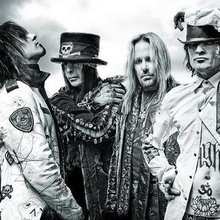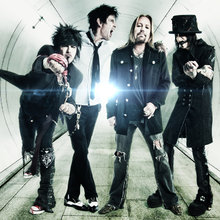The poster boys for Eighties hair metal, Mötley Crüe parlayed whip-lash hard-rock songs, melodic power ballads and a hedonistic image into platinum-level heavy-metal superstardom, topping the charts with Dr. Feelgood (Number One, 1989) and coming close with Theatre of Pain (Number Six, 1985), Girls, Girls Girls (Number Two, 1987) and a greatest-hits collection, Decade of Decadence - '81-'91 (Number Two, 1991). The Crue still record and tour, though many Americans remember the band less for their music than for their womanizing and insane chemical intake. The Crüe chronicled their exploits in their best-selling 2001 tell-all book The Dirt.
Nikki Sixx was a bassist for successful L.A. metal band London when he decided to form his own band. Tommy Lee came aboard as drummer, and they decided to call themselves Christmas. Guitarist Mick Mars was discovered through a classified ad reading, "Loud Rude Aggressive Guitarist Available." Vocalist Vince Neil was plucked from a Cheap Trick cover band. Mars came up with the new, strangely umlauted name. Their eponymous, independently released debut was picked up by Elektra Records and retitled Too Fast for Love (Number 77, 1983).
Shout at the Devil (Number 17, 1983), with its canny hints of Satanism, followed, but the band did not catch on in a big way until Theatre of Pain. Fueled by a cover of Brownsville Station's 1974 hit "Smokin' in the Boy's Room" (Number 16, 1985) and the power ballad "Home Sweet Home" (Number 89, 1985), the album sold more than two million copies.
For all the album sales, Crüe also was known as an extravagant live band, a scrappier Van Halen doing a rock version of a Vegas review, with elaborate sets and lighting, revolving drum platforms, pyrotechnics and dancing girls. Still, subsequent albums Girls, Girls, Girls and Dr. Feelgood continued the band's streak of platinum discs, selling two million and four million copies, respectively. In addition to its selection of greatest hits, Decade of Decadence included new material, such as a hard-rock cover version of the Sex Pistols' "Anarchy in the U.K."
Off stage, Mötley Crüe lived the rock & roll lifestyle to its fullest, with celebrity marriages —Tommy Lee to actress Heather Locklear, from 1986 to 1994, then to Baywatch bombshell Pamela Anderson from 1995 to 1998; Nikki Sixx to former Prince protege Vanity in 1987—substance abuse and scrapes with the law. Sixx spent more than a year addicted to heroin. In 1986 Neil was convicted of vehicular manslaughter after a drunken car accident two years earlier resulted in the death of Hanoi Rocks drummer Nicholas "Razzle" Dingley. Neil served twenty days in jail, performed 200 hours of community service and was assessed $2.6 million in damages.
After the band replaced Neil with singer John Corabi in 1992, Neil filed a $5 million wrongful termination suit and released a couple of solo albums, Exposed (Number 13, 1993) and the weak-selling Carved in Stone (1995). Mötley Crüe (Number Seven, 1994), the band's first album without Neil, produced two songs that charted on Billboard's Mainstream Rock Tracks, "Hooligan's Holiday" (Number Ten, 1994) and Misunderstood (Number 24, 1994). The band fired Corabi two years later to bring Neil back on for a reunion of the original lineup. The resulting album, Generation Swine (Number Four, 1997) attempted to cash in on the alternative-rock craze, with songs exploring grunge and industrial metal, but despite the band's carbon-copy re-recording of an old hit, re-titled "Shout at the Devil '97," the album quickly fell off the chart.
Greatest Hits (Number 20, 1998) and Live Entertainment or Death (Number 33, 1999) continued the Crüe's commercial skid. Shortly after completing the subsequent tour, drummer Lee spent four months in jail for assaulting his then-wife, Anderson. Upon being released, Lee left the band and formed the rap-metal band Methods of Mayhem, in which he played guitar and sang. Mötley Crüe replaced Lee with former Ozzy Osbourne drummer Randy Castillo and returned to its original hard rock formula for New Tattoo (Number 41, 2000). Castillo died of cancer two years later.
The band went on a recording hiatus for five years but its members, appearing on reality shows and in gossip columns, never left the public eye. In 2005, the Crüe hit the road for a reunion tour that coincided with another greatest-hits compilation, Red, White & Crue (Number Six, 2005), that included three new tracks, "If I Die Tomorrow"—penned by pop-punkers Simple Plan—(Number Four, Mainstream Rock, 2005), "Sick Love Song," and a cover of The Rolling Stones' "Street Fighting Man."
All four members of Mötley Crüe convened in 2008 to record Saints of Los Angeles, a musical companion to The Dirt. A planned Dirt movie stalled in the production stages. The title track holds the honor of being the first single to be debuted in the influential Rock Band video game series, and the album debuted at Number Four. The band took the road again in 2009 for Crüe Fest 2.
Recent events, possibly new album, The Final Tour and retirement (2011–present)
Mötley Crüe co-headlined a summer tour with Poison and special guests New York Dolls in 2011 for Mötley Crüe's 30th Anniversary and Poison's 25th anniversary.
On August 30, 2011, Mötley Crüe, along with co-headliners Def Leppard and special guests Steel Panther, announced a UK Tour commencing in December 2011.
In March 2012, Mötley Crüe announced a tour co-headlining with Kiss. The tour kicked off July 20 in Bristow, Virginia and ran through September 23.
In spring 2012, the band announced they were recording a new song that was going to be called "Sex". This track was officially released July 16, 2012, on their website.
In February 2013, Mötley Crüe announced their biggest ever Canadian tour, with more US dates expected to be announced soon after The Tour with Kiss ran through Australia in March.
In March 2013, Sixx announced that the band plans to break up for good after their next album and a subsequent farewell tour. Sixx has often expressed a desire for the band to end while they're still at what he feels is a high point in their career. Vince Neil speculated that the band would release new music in 2014 and that the farewell tour would commence in either 2014 or 2015, saying that "Tours last about two years. So to finish the world, you’ve got to do the U.S., Canada, Europe, Asia...it takes some time." Neil has also discussed the possibility of the band reuniting in the future, although Sixx has insisted that the band will never return following the tour. Both Neil and Tommy Lee have speculated that the band's farewell tour is in part due to Mick Mars' health issues stemming from his ankylosing spondylitis, although Mars has since denied those claims, which have since also been refuted by Neil.
On January 28, 2014 at the conference inside Beacher's Madhouse Theater in Hollywood, Mötley Crüe announced the full details of their retirement tour spanning 70 dates with Alice Cooper playing as a special guest. The tour is set to commence in Grand Rapids, Michigan on July 2, 2014. The band members have signed a "cessation of touring agreement" which will prevent them from touring under the Mötley Crüe name beyond the end of 2015. The tour will also serve to promote an upcoming country-music album paying tribute to the band, due for release in summer 2014, and their movie "The Dirt", due for release in 2015. However, the band did not release details on new material at the time.
In a later interview, Sixx talked about the possibility of releasing new music, saying that "We have music written, [but] it's not put together yet". He also speculated that the band would release it in a song-by-song format as opposed to a full-length album format, elaborating with "It's hard, to be honest with you, to spend six [or] nine months to write eleven songs — all those lyrics… everything… the vocals, the guitars, the bass, the sonics, the mixing, the mastering, the artwork… You put it out and nothing [happens], because now people cherry-pick songs. So we go, 'Why don't we write songs and find vehicles to get one, two or four songs to ten million people rather than eleven songs to a hundred thousand people."

